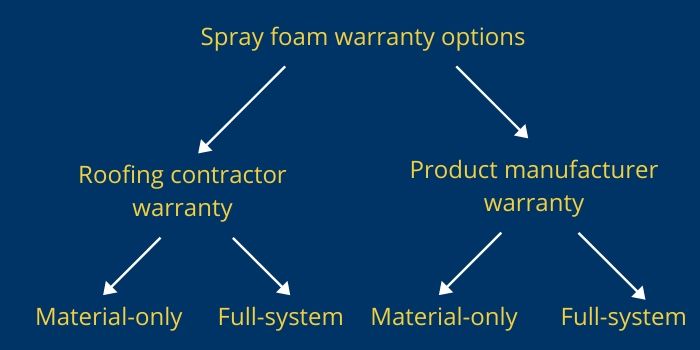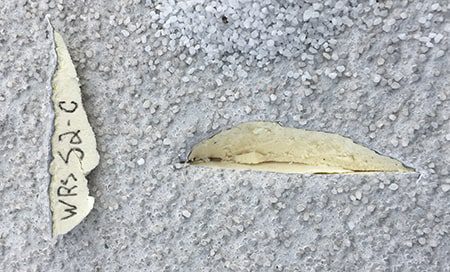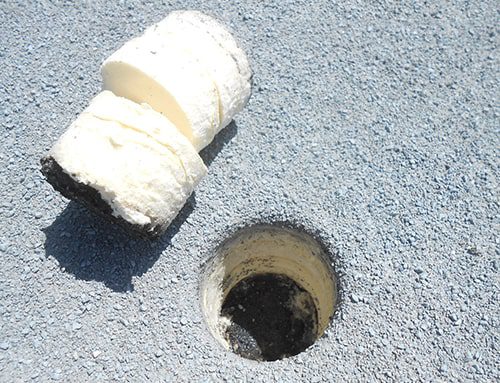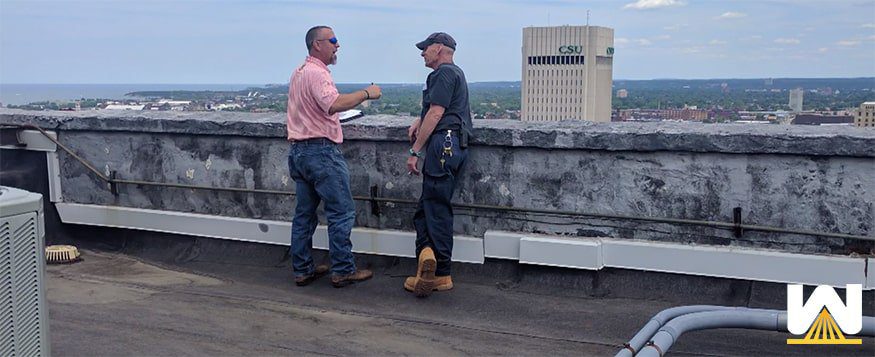When getting a spray foam roof installed, every building owner is curious about warranties and what options they can choose from.
But did you know that there are four different spray foam roofing warranty options?
Since we’ve been installing spray foam roofing systems for more than 40 years, we wanted to share our knowledge about these four warranties to help you learn the differences and choose the right one for your roofing project.
Of the four warranty options, it comes down to having your warranty through the roofing contractor or through the manufacturer of the products used. The next dividing factor is to choose a material-only warranty or full-system warranty. The difference is that full-system warranties include labor, whereas material-only ones do not.

Here is a simplified version of your spray foam roofing warranty options:
Let’s start with a brief overview of each warranty option.
The four types of spray foam roofing warranties:
Warranty Option #1 – Material-only from Roofing Contractor
This warranty says that the material will perform based on its design. If there’s a leak and it’s found that the product isn’t performing how it’s supposed to, this warranty will have you covered.
Warranty Option #2 – Full-system from Roofing Contractor
If you have a leak that’s not due to a third party or something outside of the workmanship and the installed materials (like damage from a tornado or damage from the HVAC contractor), then the repairs will be covered at no cost to the building owner.
Warranty Option #3 – Material-only from Product Manufacturer
The manufacturer warrants that the material sent to the roofing contractor will perform for the length of time it was designed to perform.
Warranty Option #4 – Full system from Product Manufacturer
The manufacturer will cover the cost for repairs of any leak due to workmanship and/or materials for the duration of the warranty.
Consider these points when deciding which warranty option to choose:
How long the roofing contractor has been in business
If the roofing contractor has only been in business a few years, that’s a huge red flag because you don’t know if they will be around for the full 10-20 years of your warranty.
Say you got a 10-year warranty with a newer roofing contractor and suddenly, that roofing contractor goes out of business after 3 years.
What happens next?
The manufacturer will have a network of licensed applicators to address your warranty concerns should the original installer no longer be in business.
A building owner would be wise to choose a reputable roofing contractor that’s been around for multiple decades.
Is this an end-of-the-world issue? No. But one that can easily be avoided by choosing a reputable contractor.
The timeliness of service
If you choose the route of manufacturer warranties, product-only or full-system, a red flag is the time it may take to answer your service call.
If you have a roof leak, you’ll need to contact the manufacturer, who will notify the roofing contractor that completed the job that a leak report has come in.
After getting approval from the manufacturer, that roofing contractor will go back to the job site, investigate, repair, and then turn in a report to the manufacturer.
If you had your warranty through the roofing contractor, you can eliminate the middleman by excluding the product manufacturer.
This sort of middleman has extended service calls from being done in 1-3 days with a roofing contractor, to multiple weeks with the added step of going through manufacturers.
This is a hefty price to pay when your roofing is letting water in.
Being aware of what isn’t covered under warranty
Knowing what’s covered under warranty is just as important as knowing what isn’t covered under warranty.
No matter which warranty you have, there are a few instances where damage caused by these events will not be covered. Here are a few examples:
- Acts of God – Acts of god would include hail, tornados and hurricanes. So if you live in an area prone to hurricanes, you might want to choose a roofing system that performs well against high winds.
- Animals – No roofing contractor will cover damage caused by animals. Bird pecking has been an issue for some spray foam roofs, as well as squirrels and raccoons for any kind of roofing system.
- Other Contractors – There have been plenty of scenarios where another contractor goes onto the roof, causes damage, and the building owner is left wondering who’s going to fix their leak. An example that happens often is an HVAC contractor will go on the roof to service the AC units. They remove the panels and they stick them into the spray foam roof. They can also drop a few nails and screws, step on them, and cause a puncture in the spray foam roof. These types of incidents would not be covered under any warranty type.
Now that we know some more facts about warranties, let’s dive into how the warranty is granted.
How the warranty is granted for your spray foam roof
Once the roof is finished being installed, the roofing contractor and the manufacturer will work with a 3rd party inspector to make sure what’s done has actually been complete.
The inspector will take a slit sample to make sure the coating has been applied at the correct millage.

He’ll also inspect the core sample to make sure the spray foam underneath has been applied at the correct depth and has developed the proper physical characteristics.
Here is an example of a core sample:

The inspector will also make sure all other details of the job description has been completed as stated in the scope of work.
Once the inspector signs off, the warranty begins.
When my warranty is over, how can I renew it?
If you get a 15-year warranty on your spray foam roof, in the 14th year, you’ll be notified by a roofing contractor to schedule a recoat.
If your roof has been properly maintained, all that will need done is to power wash the roof and add more coating. After the coating, depending on what millage you’d like, that will determine how long your next warranty will be.
Spray foam roof warranty conclusion and next steps
Choosing the right warranty for your spray foam roof is one of the best ways to make sure your roof is covered should something go wrong.
So, once you’ve researched the four options above, you can then determine which warranty is best for you and your building.
Remember:
- There are four warranty options to choose from
- Be aware of how the warranty is granted
- Know the costs of each warranty option
- Remember to budget when it’s time for a recoat so you can renew it
For the past 40 years, West Roofing Systems has been dedicated to renewing, restoring, and repairing commercial roofing systems. We do this by offering the right roofing system, at the right price, that is the most beneficial to our clients.
If you’d like more information on spray foam roofs, please check out The Ultimate Guide to Spray Foam Roofing, which answers questions, like:
- How much does a spray foam roof cost?
- How long does a spray foam roof last?
- What’s the chemical makeup of the spray foam roofing material?

